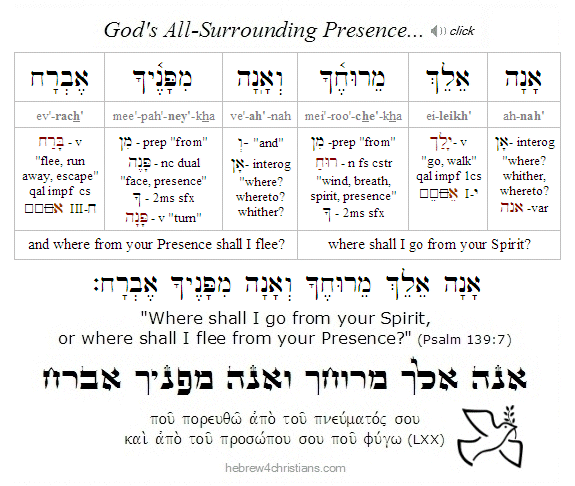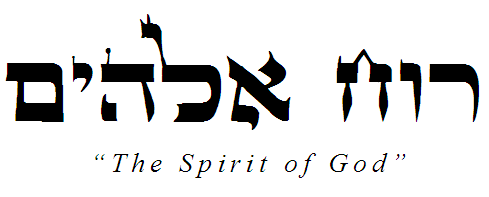|
Introduction
"The Spirit of God hath made me, and the breath of the Almighty hath given me life."
(Job 33:4)
From the time of creation constant reference is made in Holy Writ to Messiah and the Messianic hope of Israel. 'The Spirit of God moved upon the face of the waters'; the Spirit of God means Messiah.
(Midrash Genesis Rabbah 2; Leviticus Rabbah 14)
The Spirit of YHVH is YHVH Himself...
In the Tanakh, the word ruach generally means wind, breath, mind, spirit. In a living creature (nephesh chayah), the ruach is the breath, whether of animals (Gen 7:15; Psa 104:25, 29) or mankind (Isa 42:5; Ezek 37:5). God is the creator of ruach: "The ruach of God (from God) is in my nostrils" (Job 27:3). In God's hand is the ruach of all mankind (Job 12:10; Isa 42:5). In mankind, ruach further denotes the principle of life that possesses reason, will, and conscience. The ruach imparts the divine image to man, and constitutes the animating dynamic which results in man's nephesh as the subject of personal life.
When applied to God, the word Ruach indicates creative activity (Gen 1:2) and active power (Isa 40:13). The Spirit of God also works in providence (Job 33:4; Psa 104:30), in redemption (Ezek 11:19; Ezek 36:26-27), in upholding and guiding his chosen ones (Neh 9:20; Psa 143:10; Hag 2:5), and in the empowering of the Messiah (Isa 11:2; Isa 42:1; Isa 61:1).
In short, as the ruach is to the created nephesh, so the Ruach Elohim is to God Himself, part of God and identified with God. Ruach may be understood as the Author of the animating dynamic of the created order, the underlying Principle of creation, and the One that imparts the nephesh to the entire universe.
The Spirit of God


Ruach Elohim.
The Spirit of God.
References: Gen. 1:2; Gen. 41:38; Exod. 31:3; 35:31; Num. 24:2; 1 Sam. 10:10; 11:6; 16:15f, 23; 18:10; 19:20, 23; 2 Chr. 15:1; 2 Chr. 24:20. Note that in many of these references note that the Spirit of God "came upon" an individual and enabled him to speak or act on behalf of YHVH.
The Spirit of the LORD


Ruach Yahoveh.
References: Jdg. 3:10; 6:34; 11:29; 13:25; 14:6, 19; 15:14; 1 Sam. 10:6; 16:13,4; 19:9; 2 Sam. 23:2; 1 Ki. 18:12; 22:24; 2 Ki. 2:16; 2 Chr. 18:23; 20:14; Isa. 11:2; 40:7, 13; 59:19; 63:14; Ezek. 11:5; Hos. 13:15; Mic. 2:7; 3:8.
Note: A distinction was made by ancient Jewish authorities between the "Spirit of the Lord" and the Shekhinah, or the (tangible) presence of God. This distinction is made in the Talmud, which gives a list of things found in the first Temple in Jerusalem, but missing in the second Temple. The Shekhinah may have referred to God's actual dwelling within the Holy of Holies, and God's presence emanating outward from it in a special way, though this is speculative and not based on the scriptures found directly in the Tanakh.
The Holy Spirit


Ruach Hakkodesh.
The Holy Spirit.
Reference: Psalm 51:11
The Spirit of the LORD God


Ruach Adonai Yahoveh.
The Spirit of the LORD God.
Reference: Isaiah 61:1
The Spirit of God


Ruach-El.
The Spirit of God.
Reference: Job 33:4


"The Spirit of God has made me, and the breath of the Almighty has given me life."
(Job 33:4)
 |
|

